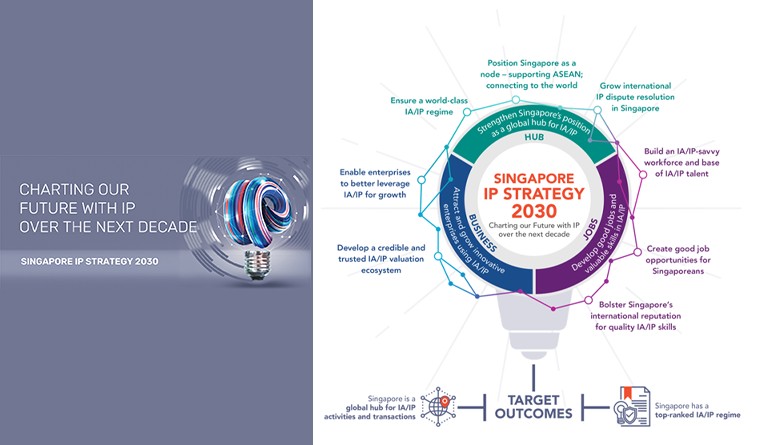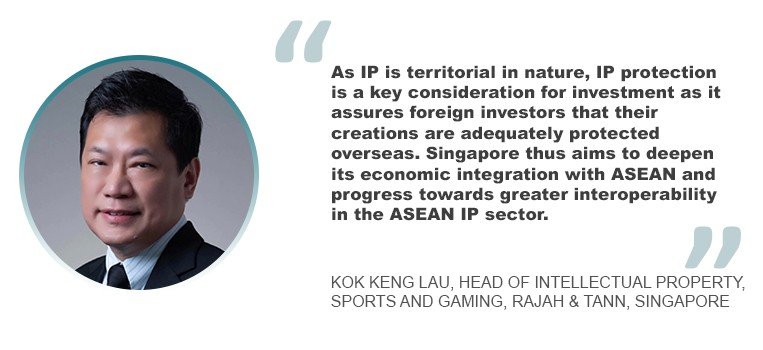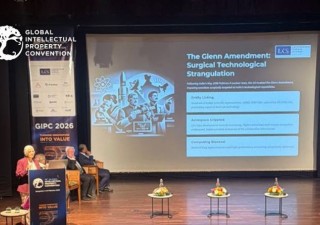Singapore’s march to be the world’s IP hub continues
29 February 2024

Photo: IPOS | Singapore IP Strategy 2030
As the world is shifting towards an innovation-based economy, Singapore has made strides to position itself as a global hub for intangible assets and intellectual property. Ivy Choi reports from Singapore.
To strengthen its position as a global hub for intangible assets (IA) and IP, in 2021 Singapore initiated the Singapore IP Strategy 2030 (SIPS), as a continuation of the success of the 2013 IP Hub Master Plan, in which Singapore has developed itself as an IP hub in Asia. As the world is shifting towards an innovation-based economy, Singapore has made of a good example of the dedication and tactful planning it takes to remain a top-ranked IP regime with this 10-year blueprint.
According to the SIPS 2030 Report published by the Government of Singapore and the Intellectual Property Office of Singapore (IPOS), SIPS consists of three main objectives: to strengthen Singapore’s position as a global hub for IA and IP; to attract and grow innovative enterprises using IA and IP; and to develop good jobs and valuable skills in IA and IP. While these objectives may sound broad and general, SIPS also details the specific areas Singapore is working on, with actual policies and initiatives in place to achieve these goals. At the same time, it also means that businesses should fully utilize the opportunities afforded in this thrust of initiatives, as suggested by Kok Keng Lau, head of intellectual property, sports and gaming at Rajah & Tann in Singapore.
“Singapore businesses should be aware of the impending changes to Singapore’s IA and IP regime, both in terms of policy and infrastructure,” Lau said. “Businesses should also consider how they can benefit from the government’s efforts to increase enterprises’ access to IA and IP services and to help enterprises unlock potential new sources of capital through IA and IP.”
Lau explained what businesses should expect from SIPS’s planning for Singapore to strengthen itself as a global hub for IA and IP. “Businesses should expect further reform to the IA and IP regime through policy reviews and digitalization initiatives, including enhanced IA and IP filing and management systems. It should also be anticipated that Singapore will continue to develop its position as a node supporting ASEAN and connecting the world, and to grow its IA and IP dispute resolution capabilities.”
Rena Lee, chief executive of IPOS, said that in order to keep pace with technological and other advancements in innovation and creativity, IPOS regularly reviews its policies, processes, and programmes to ensure that they are relevant. She shared some examples: “Singapore concluded the most comprehensive review of its copyright regime to date, resulting in the Copyright Act 2021, which ensures that Singapore remains responsive to digitalization. As part of the review, Singapore introduced a copyright exception for computational data analysis that supports AI and data-driven innovation by permitting the responsible use of copyright works for purposes such as text and data mining, sentiment analysis and machine learning.” She also shared about the work IPOS has done with other parties to monitor developments of AI technologies for IP. “For example, IPOS and the Infocomm Media Development Authority supported a study by the Singapore Management University Centre for AI and Data Governance on the intersection of AI and IP.”

Speaking of the progress of digitalizing Singapore’s IP filing and management systems, Lee said: “IPOS has been offering digital services for filing and managing IP in Singapore through an online portal since 2000. The IPOS Digital Hub has gone through several iterations and now features a user-friendly interface, enhanced search function, IP management features, and enhanced support for IP dispute resolution processes. With the help of AI and automation, processes have been streamlined for a faster and more efficient user experience.”
In addition to the online portal, IPOS also introduced the world’s first mobile app for trademark registration in 2019. Named IPOS Go, the mobile app allows businesses to file trademarks in less than ten minutes. It also features a “brand search” function for simultaneous search of similar business names, trademarks, web domains, and social media usernames. What’s more, businesses can renew multiple types of IP, including trademarks, patents and designs, and manage their IP portfolios via the app.

One of the strengths of Singapore is its strong interconnectivity with ASEAN, and thus SIPS aims to position Singapore as a node for ASEAN. Lau said: “As IP is territorial in nature, IP protection is a key consideration for investment as it assures foreign investors that their creations are adequately protected overseas. Singapore thus aims to deepen its economic integration with ASEAN and progress towards greater interoperability in the ASEAN IP sector.”
Lee said that to overcome challenges posed by territoriality, Singapore is signatory to international treaties and work-sharing agreements with other IP offices to help IA and IP owners take their innovations internationally more easily. She said: “As a founding member of the ASEAN Working Group on IP Cooperation (AWGIPC), Singapore participates in several task forces to improve the regional IP framework with best practices for IP protection. Singapore was an early adopter of the ASEAN Patent Examination Co-operation (ASPEC) programme, which is the first regional patent work-sharing programme to improve the quality of patent search and examination. Singapore is also the first ASEAN country appointed as an International Searching Authority and International Preliminary Examining Authority (ISA/IPEA) of the World Intellectual Property Organization’s (WIPO) Patent Cooperation Treaty.”
According to Lee, IPOS is well-connected with other IP offices through the Global Patent Prosecution Highway (GPPH) network, as well as bilateral Patent Prosecution Highway (PPH) agreements with partner IP offices. One of the latest schemes is a PPH agreement with the Saudi Authority for Intellectual Property (SAIP). These IP networks and programmes can help accelerate patent applications in ASEAN and over 30 markets, including China, Japan, South Korea, Germany, the United States, Europe, the Middle East, etc.
Another focus of SIPS is to further develop Singapore’s international IP dispute resolution services. Lau said: “As a leading international dispute resolution hub in the world, Singapore is in a strong position to be a choice venue for IP dispute resolution. SIPS builds on initiatives targeting areas that are unique to IP and technology disputes and concentrates on two fronts – building IP dispute resolution capabilities in Singapore, and marketing Singapore’s IP dispute resolution services internationally.”
“We have built a suite of international IP dispute resolution services and expertise across litigation, arbitration, and mediation for a variety of cross-border commercial disputes,” Lee said. “Our dispute resolution institutions have access to global experts, and Singapore is also the only country in the world where the WIPO Arbitration and Mediation Centre (WIPO Centre) has an office outside of Geneva.”
Lee suggested that Singapore’s open regime can facilitate cross-border dispute resolution, as parties may engage lawyers from their own jurisdictions to represent them. She noted that non-resident lawyers who come to Singapore to represent their clients do not need a work pass if they are only staying for up to 90 days.
To promote Singapore’s dispute resolution services internationally, Lee said that the WIPO-Singapore ASEAN Mediation Programme (AMP) was launched in July to promote mediation in the ASEAN region. “It offers funding of up to S$8,000 (US$6,000) for each mediation of a technology or IP dispute mediated by a Singapore-based mediator and administered by the WIPO Centre’s Singapore Office.”
Besides funding, IPOS has also recently put together a list of Singapore-based technical and IP valuation expert witnesses who can assist in IP and technology disputes. Lee said: “This is alongside the enhanced IPOS business clinic to advise enterprises on internationalizing their IP and building a sound IP dispute resolution strategy as they expand into markets such as ASEAN and China.” In addition, she said that a promotional brochure – available for English- and Chinese-speaking audiences – also provides links to the model dispute resolution clauses of Singapore’s international dispute resolution institutions, so parties can include relevant clauses into their cross-border contracts.
Some updates have been made to Singapore’s legislative framework regarding IP dispute resolution as well. Lee said: “The most recent enhancements were introduced in April 2022, through the new Supreme Court of Judicature (Intellectual Property) Rules 2022 (SCJIPR 2022). A key improvement was the optional track for IP litigation – Simplified Process for Certain Intellectual Property Claims, aimed at helping small and medium-sized enterprises save time and costs in litigation. Under the Simplified Process, qualifying IP disputes which do not exceed S$500,000 (US$376,000) in relief claimed can now be resolved in a more simplified and streamlined manner.”
Furthermore, Lee said that the SCJIPR 2022 also streamlined the Rules of Court relating to IP rights into a single piece of legislation, which included obligations to notify the Registrar of Designs, Geographical Indications, Patents and Trademarks, and harmonized related provisions across IP rights. “Other enhancements in 2022 included the consolidation of most civil IP cases in the High Court, which simplifies the previous system where civil IP disputes are heard in multiple fora, depending on the nature of the IP right, the type of proceeding or the value of the claim. In 2019, amendments were also made to the International Arbitration Act to enhance Singapore’s legal framework for international arbitration. Amendments made clear that IP disputes can be arbitrated in Singapore, and arbitral awards for IP disputes are enforceable in Singapore.”
The second focus of SIPS is to attract and grow innovative enterprises. According to Lau, deeper and sustained public-private partnerships are one of the means to help local enterprises capture new business opportunities. For example, IPOS and the Singapore Business Federation have jointly developed the Workforce for IP-Savvy Enterprises programme (WISE) to help enterprises build their foundational IA and IP knowledge, access preliminary IA and IP advice, and be plugged into the global IA and IP network. Another example is GRIT, standing for Growing with Resilience through InTangibles, which is an inter-agency initiative offering a range of sector-specific engagements, resources, and training to help equip businesses and communities with IA and IP knowledge and skills tailored to address their individual IA and IP challenges.
The third focus of SIPS is to create job opportunities and develop a talented workforce with IA and IP skills and competencies. Lee said: “Key initiatives to develop IP skills in the workforce include the Skills Framework for IP launched in 2019 that was jointly developed by SkillsFuture Singapore (SSG), Workforce Singapore and IPOS, along with industry associations, training providers, organizations, and unions. The Skills Framework for IP, which builds on the IP Competency Framework, provides information on the sector, career pathways, job roles, skill requirements, and relevant training programmes, enabling enterprises to better plan for their IA and IP manpower. Some job roles covered under the Framework include IP executive, patent attorney, IP strategist, and IP analyst.”
Lee said IPOS has also been working with the institutes of higher learning (IHLs) and professional associations to offer full-time IP programmes and professional development courses for working and IP professionals. “In 2017, IPOS collaborated with the Singapore University of Social Sciences to roll out the Master of IP and Innovation Management (MIPIM) programme that integrates IA and IP knowledge and skills from the legal, business, and technology domains.” IPOS also established IP Academy, Singapore’s only dedicated centre for IP education and training, through which over 7,000 attendees are trained annually, including enterprises, individuals, public officers, professionals and students. IPOS has also developed IA and IP training modules for senior business leaders to deepen capabilities in IA and IP management and capitalize on IA and IP for business growth.
Finally, Lau advised that businesses should familiarize themselves with the changes regarding the enhancements to Singapore’s IA and IP regime, and consider whether they will require any amendments to their operations or policies. “As for the impending and existing initiatives to help enterprises make better use of their IA and IP resources and to obtain financing through IA and IP, businesses should access which initiatives are applicable and seek to utilize the relevant opportunities,” he said.






